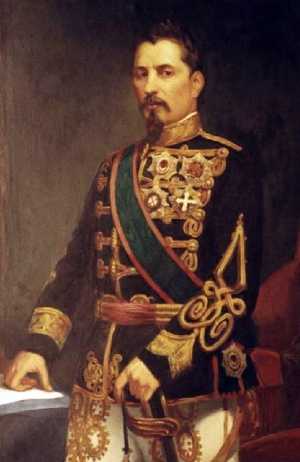 SKC Films Library SKC Films Library |
|
|
| SKC Films Library >> General and Old World History >> Balkan Peninsula >> Romania >> 1822-1881 |
 Alexandru
Ioan Cuza Alexandru
Ioan Cuzathe first prince of a unified Romania Alexandru Ioan Cuza (also spelled Alexander John Cuza) was born into a noble family at Galatz, Moldavia, on March 20, 1820. He was educated at Jassy, Pavia, Bologna, Athens, and Paris, and received a degree in letters from the Sorbonne in 1835. While in school he was active in Romanian student circles. Returning to Moldavia in 1839, he served a brief stint in the army and then entered the judicial system. He married Elena Rosetti in 1845. In the late-1840's, Cuza became an active member of the Moldavian nationalist and reform movements. In mid-1848 he was exiled from Moldavia by Prince Mihail Sturdza for taking part in revolutionary activities and took refuge in Vienna. He returned to Moldavia in 1850, after Grigore Ghica, a supporter of the Moldavian Revolution, became Prince of Moldavia. He was subsequently appointed president of the tribunal, and later prefect, of Galatz. He rejoined the army in 1857, and was named Minister of War in 1858. In 1858, Cuza represented Galatz in the assembly which was elected to nominate a Prince for Moldavia. A prominent speaker in the debates and strong advocate of the union of Moldavia and Walachia, he was elected Prince of Moldavia by the assembly at Jassy on January 5, 1859, and Prince of Walachia by the assembly at Bucharest on February 5, thus becoming Prince Alexandru Ioan I of the United Principalities of Wallachia and Moldova. However, since the Convention of Paris (August 19, 1858) provided for a continued separation of the two principalities, his authority was not recognized by his nominal sovereign, the Sultan of Turkey, until December 23, 1861, when the principalities were formally unified into the nation of Romania. As ruler of Europe's newest nation, Prince Cuza worked to improve the lives of the peasant class, often at the expense of the upper classes. In 1863, he secularized monastic land holdings in order to provide land to the peasantry, but an 1864 bill granting peasants title to the land they worked was defeated by the Romanian Assembly. In response to this defeat, Cuza held a plebiscite asking the people to give him the power to rule by decree; the measure passed by a landslide. Cuza then got a bill passed that gave peasants title to the land they worked, but, by way of compromise, allowed landlords to retain ownership of one third. Prince Cuza also provided Romania with a Criminal Code and a Civil Code, both based on the Napoleonic Code; established tuition-free, compulsory public education for primary schools; founded the University of Iasi in 1860, and the University of Bucharest in 1864; and, helped develop the Romanian Army into a modern European-style army. Although Prince Cuza did much to improve the lives of the peasantry, his reforms often failed in the long run. In addition, his land reform measures led to resentment among the landed class. This resentment grew until, in the early morning of February 23, 1866, a band of military conspirators broke into the palace and compelled the prince to sign his abdication and leave the country. The Romanian Assembly subsequently elected Prince Karl of Hohenzollern-Sigmaringen as the country's new ruler, and he ascended to the throne as Prince Carol I on March 26, 1866. Prince Alexandru Ioan Cuza I spent the rest of his life in exile. He died in Heidelberg, Germany, on May 15, 1873. SEE ALSO |
| SKC Films Library >> General and Old
World History >> Balkan Peninsula > Romania > 1822-1881 This page was last updated on April 13, 2017. |